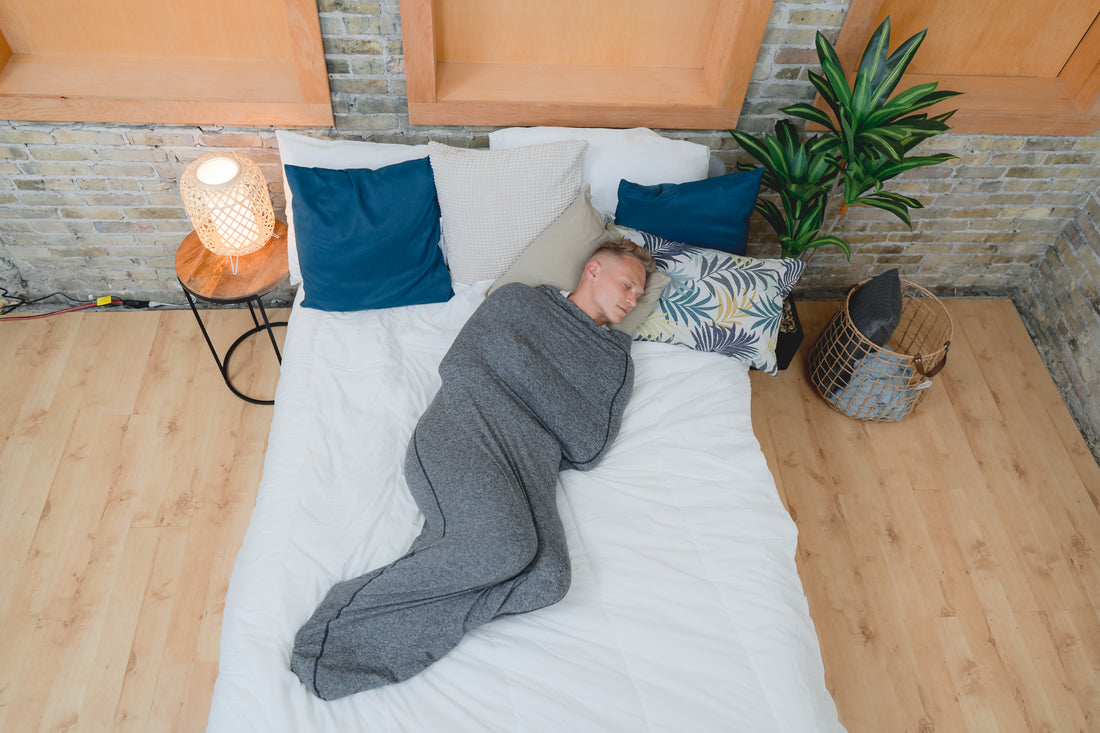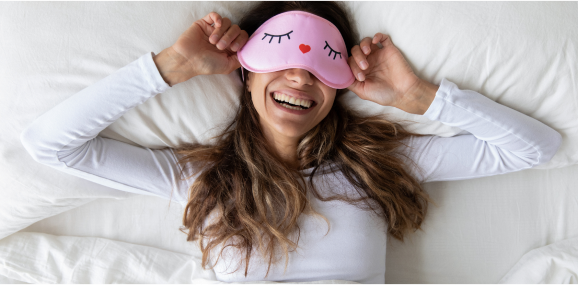You wake up in the middle of the night, hot, sweaty, and now irritated because you can’t seem to fall back asleep.
You’re probably wondering why this even happens and if there is any way to fix it — there are many reasons why your body may get so hot at night, and the causes can be unique for each person.
Knowing what is causing you to feel so overheated can make it easier for you to prevent it in the future, and the good news is that you’ve come to the right place to learn all about it!
It’s Getting Hot in Here — What Factors Contribute To Night Sweats?
Do you wake up with the comforter on the ground and your clothes sticking to you with sweat? It happens, and for you it might happen all the time. But what causes this? Many different factors can contribute to night sweats and overheating — here are the most common.
Medication
Certain medications can lead to a rise in body temperature, and may affect the way your body is able to regulate temperature. Thermoregulation is how we keep our body temperature within certain boundaries, even when surrounding temperatures are fluctuating.
Here is a list of the most common medications that may raise the body’s temperature:
- Medication used for diabetes, such as insulin
- Antibiotics, such as penicillin and cephalosporins
- Hormone therapy medications
- Pain killers, such as any acetaminophen or aspirin
- SSRIs or tricyclic antidepressants
- Steroids, such as cortisone or prednisone
- Recreational drugs, such as cocaine or ecstasy
- Psychotropics
- Synthroid medication for hypothyroidism
Unfortunately, the list goes on. It’s important to talk with your doctor about the medications you’re on so you can determine if one of your prescriptions might be the reason you’re feeling a little too warm at night.
Do not stop taking any medication without consulting your doctor first. Your doctor can work with you to devise a plan, and may recommend an alternative medication or different dose if need be.
Room Temperature
Feeling too warm or waking up sweating could be related to the temperature that you have set in your home. In a 2012 research review, it was found that exposure to heat during the night increases wakefulness and further decreases slow wave sleep, also known as deep sleep. Warm temperatures during the night can also disrupt rapid eye movement sleep, or REM sleep.
So, it does make sense that when you wake up drenched in sweat, you become fully awake and are unable to fall back asleep. This can then result in lack of sleep, and could even lead to certain sleeping disorders.
The optimal room temperature for sleep is anywhere from 66 degrees to 70 degrees. To help combat night sweats, try turning down the thermometer or opening a window, and see if that helps improve your sleeping experience.
Activities Prior to Sleep
What you do before you sleep can impact your body temperature. Some activities and behaviors that can have negative effects on your sleep include:
- Exercise. Exercising is great for your health but doing it right before you hit the pillow could prove to be the cause of excessive sweating at night. Exercise not only raises your body temperature, but also your heart rate. Try exercising earlier in the day to avoid facing the consequences of an energizing workout at bedtime.
- Stressful activities. Stressful activities can include many different things, but to name just a few, handling work emails, paying the bills during a tight month, or anything else that may cause stress has the potential to negatively impact your sleep as well as your body's ability to cool down. When stressed, your blood vessels constrict, which in turn can increase your core body temperature. So, try to stay away from anything that might cause stress before bed, and instead replace it with something relaxing like reading a book or watching an episode of your favorite show.
- Caffeine. Drinking caffeine before you go to bed is never recommended due to its natural ability to increase mental alertness, cause jitters, and increase core body temperature. If you have trouble getting comfortable at night after enjoying a late afternoon cup of joe, you may want to switch to caffeine-free herbal tea.
Illness and Infection
Many common illnesses and infections can lead to an increase in body temperature at night. These illness can include:
- Flu
- Pneumonia
- Strep throat
- Common cold
- Tuberculosis
- Bacterial infections
Many of the above can cause fevers, which raise body temperature in an attempt to combat illness. The brain’s hypothalamus controls your body temperature, and, in response to an infection or illness, may reset the body to a higher temperature to try and kill off foreign invaders.
If you are currently feeling under the weather, your illness might be the reason you’re waking up with night sweats.
Those Who Sleep Next to You
If you sleep with your partner, your dog or cat, or both, this could be a reason why you are getting so hot at night. The combined temperature of everyone in the bed can raise the overall temperature not only in the bedding, but in the room itself as well.
Humans and animals are consistently giving off body heat because of how our metabolisms work. The more bodies that are in the same space, the quicker the area will heat up.
This doesn’t mean you should kick everyone off the bed, but you can implement other ways to keep your room and bed cool, such as decreasing the temperature in the home overall, getting a fan, or using cooling sheets.
Hormones
Hormone levels are a major factor in body temperature, and imbalances in your hormones can cause an elevated body temperature.
Many women experience night sweats due to fluctuations in estrogen and progesterone levels, and women going through menopause may be especially prone to night sweats and hot flashes. Menopause occurs in older women due to a reduction in estrogen over time, and pregnancy is yet another cause for hormonal changes that lead to raised body temperature in women.
If you have certain thyroid disorders, these are also known to affect hormone levels and could be another reason why you are left feeling hot and sweaty.
Bedding and Sleepwear
Your bedding, sheets, extra blankets or comforters, and even pillows can impact your body temperature. The bedding you have acts as an insulator, and thicker bedding usually traps more heat than thinner bedding.
What you wear to sleep can also lead to overheating depending on the material. Cotton, wool, and polyester all have different heat-retaining properties, so stick to light, breathable material to help you stay cool.
Most blankets are made of a thicker material that can trap a lot of heat. After ten minutes, you may be sticking your leg out of the blankets because you’re too hot. So, do you just suffer from the cold with no blanket, or is it better to be uncomfortable with a hot blanket?
We’ve got one solution, and it’s called the Sleep Pod.
Hug Sleep has created a blanket designed to hug you back, keep you cool at night, and promote a better night of sleep. The Sleep Pod is designed with a unique cocoon-like shape that covers your entire body and applies a gentle and calming pressure, all without causing you to overheat.
The Sleep Pod was made with science in mind. Using the therapy of Deep Touch Pressure, this blanket is able to administer pressure to the body that helps promote feelings of calmness. This comforting pressure naturally induces relaxation and helps ease you into sleep.
The Sleep Pod is made from a specialized 4-way stretch material. It’s breathable, light weight, and does not trap heat! It’s the perfect blanket to cuddle up with at night if you are someone wanting the comfort of a blanket without the heat and excessive sweating that usually come along with a thick blanket’s comfy embrace.
The newest design, the Sleep Pod Move, also offers added mobility and feet freedom so that if you need to get up for that midnight glass of water or you just want to put your feet out for a little extra cooling, you can!
If you want effortless comfort and a good night of sleep without the hassle of waking up in the middle of the night drenched in sweat, the Sleep Pod can help!
Food and Metabolism
If you just ate before bed, this could be the reason why you’re sleeping hot. Your body’s metabolism is still working hard to break down the food, even as you try to get to sleep. This natural process of digestion can cause the body’s core temperature to rise.
Pay attention to what time you’re eating dinner or if you’re late night snacking — this could be a factor for why you’re so hot during the night.
Solutions for Excessive Sweating at Night
Are there any real solutions to night sweats and waking up the next day covered in sweat?
Absolutely! Try some of the following, and make sure to keep track of what helps and what doesn’t really make much of a difference — everybody is different!
- Turn down that AC! We know you’re trying to save a few coins, but turning the thermometer down a few notches won’t break the bank.
- Try exercising earlier in the day. Late night jogs might seem nice because it’s cooler outside, but it’ll cause your body to be hotter at night as you try to fall asleep.
- Be aware of those sleeping with you. If you have seven dogs that all sleep with you, maybe reevaluate getting them their own beds so you can sleep cool at night.
- Try out the Sleep Pod by Hug Sleep! This blanket is a great way to stay cool while also staying comfortable and relaxed, not to mention the benefits of deep touch pressure stimulation to help ease restlessness and soothe you to sleep.
- Get your dinner earlier. A late night pasta at ten o’clock at night might sound yummy, but you’ll regret it later when you wake up in the middle of the night sweaty and uncomfortable.
- Talk with your doctor. See if any of the medications you’re on could be a reason for your night sweats and see the next best step for you.
Conclusion
Sleeping hot can be a frustrating reality for many, but there are ways to combat it. Making minor lifestyle changes to your exercise schedule, the foods or beverages you consume at night, and your sleeping arrangements may help you find relief from night sweats.
Night sweats may also be caused by certain medications or illnesses, in which case it is best to consult your doctor for professional advice regarding how you can safely keep your body temperature down while you sleep.
Sources:
Why Do I Get So Hot When I Sleep? 7 Reasons Plus Solutions | Healthline

































500,000+ happy customers